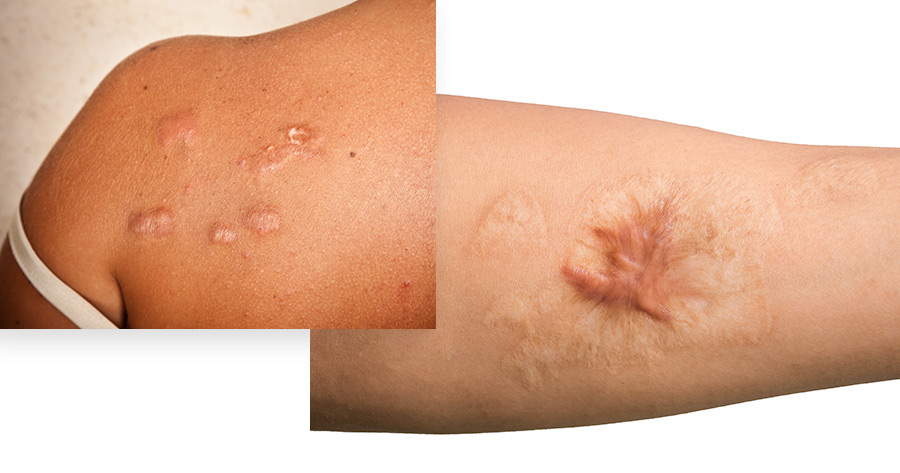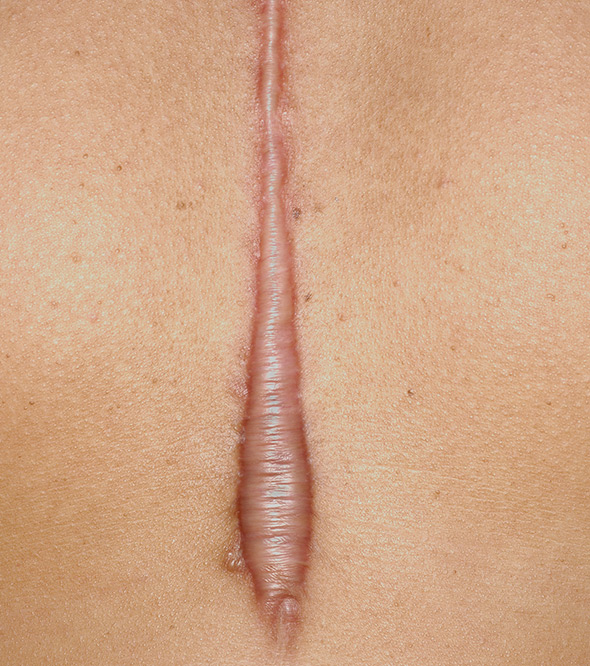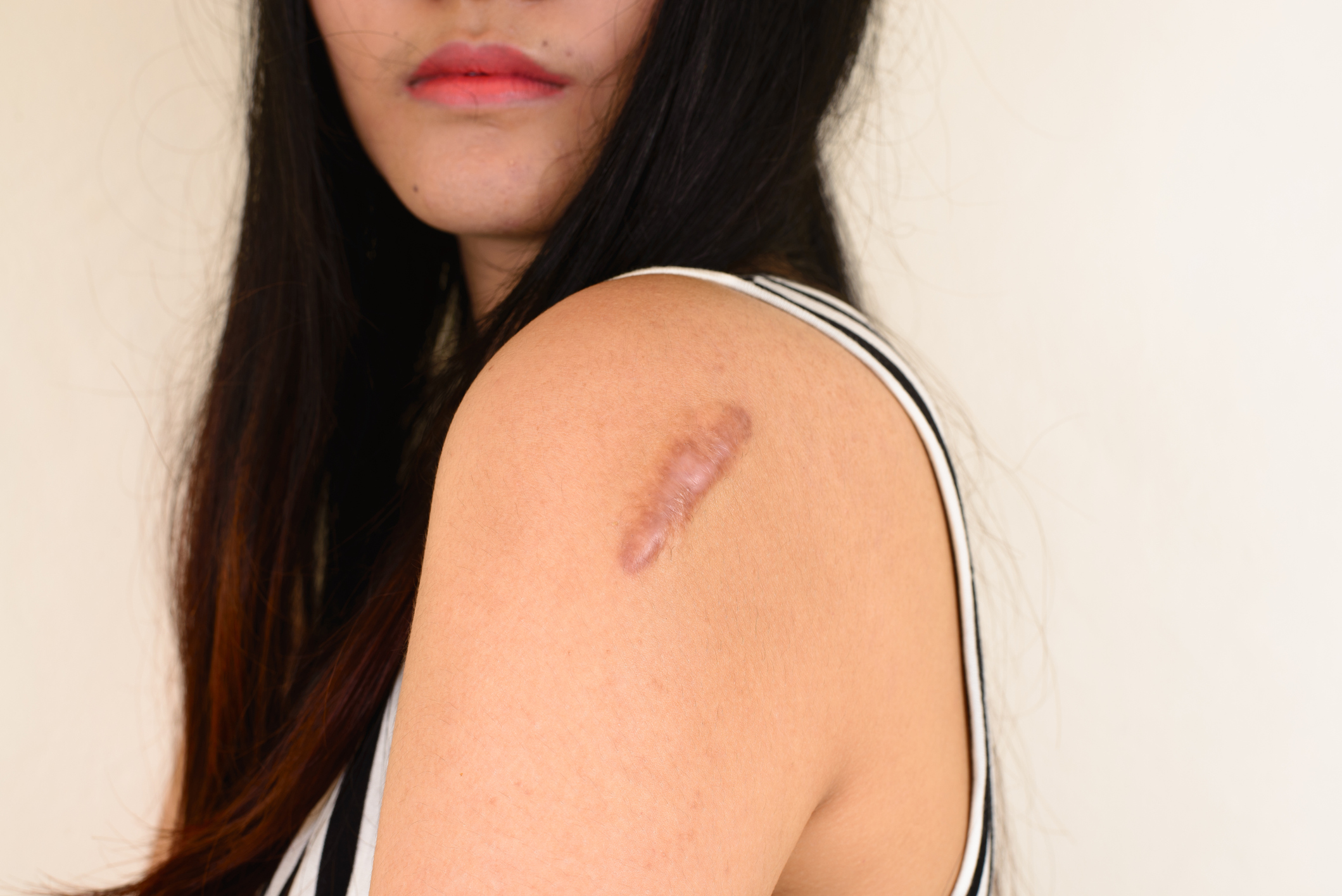Keloids can be frustrating, painful, and emotionally distressing. At Advanced Dermatology, P.C., we understand the challenges posed by these abnormal scars. That’s why we offer a groundbreaking solution: Superficial Radiation Therapy (SRT-100).
To learn more about this treatment option, please contact us directly or continue reading below.
Keloids are abnormal, thick scars that form in response to skin injuries. These can develop from surgeries, cosmetic procedures, or minor traumas like piercings or acne.
Historically, keloids have been challenging to treat due to their tendency to recur, often larger and more painful. Traditional methods can be painful, ineffective, and unsuitable for children. While radiation therapy for keloid scars is an option, it carries risks to deeper organs and may not be safe for younger patients.

Keloid scars are an overgrowth of scar tissue that extends beyond the original wound. While the exact cause is unknown, it’s believed to be related to an abnormal healing process.
Common triggers linked to keloid causes include:
It’s important to note that not everyone who experiences a skin injury will develop a keloid scar. The reasons why some people are more susceptible than others are still being studied.
Keloid scars often have distinct characteristics:
It’s important to note that while keloids can be unsightly and uncomfortable, they are generally harmless. However, if you’re concerned about skin growth, it’s always best to consult a dermatologist at Advanced Dermatology, P.C., for a proper diagnosis.
Keloid scars can be persistent and challenging to treat. While there’s no guaranteed cure, various options are available to manage their appearance and discomfort.
Traditional treatment options include:
In addition to these treatment options, superficial radiation therapy is a leading-edge treatment that has shown promising results in managing keloids. Unlike traditional radiation, SRT-100 targets only the surface of the skin, minimizing the risk of damage to underlying tissues.
If you’re struggling with keloid scars, SRT-100 may be a valuable option. Consult with a dermatologist to determine if this treatment is right for you.
SRT-100 is a non-invasive procedure that involves the targeted delivery of low-dose radiation to the keloid scar. It’s typically performed after the keloid has been surgically removed.
SRT targets the cells that cause the abnormal and overabundance of scar tissue. First, the scar tissue bundle must be excised by shave removal or regular excision. Our dermatologists can excise the keloid. Within 24 hours of removal, the area should be treated with SRT to reduce abnormal collagen production.
Here’s a general overview of what to expect:
It’s important to know that the specific details of your treatment may vary depending on the size and location of your keloid. Your dermatologist will provide personalized instructions. For the best results and to prevent recurrences, it is recommended that 2-3 consecutive daily treatments be performed. The procedure is painless and well-tolerated. There are no restrictions and no downtime.

The main benefits of keloid treatment using the SRT include:
While SRT is generally considered safe, there are potential side effects, including:
Discussing these potential risks with your dermatologist before undergoing treatment is essential.
While SRT is highly effective in reducing keloids’ size, appearance, and discomfort, there’s no definitive treatment that can completely eliminate them in all cases.
The tendency for keloids to recur is a complex issue influenced by individual factors, including:
The cost of SRT-100 keloid treatment can vary significantly based on several factors:
It’s essential to consult with a dermatologist to get an accurate estimate for your specific case. They can provide a detailed breakdown of costs and discuss potential payment options or financing plans, ensuring you understand the potential outcomes as seen in our before and after keloid scars treatment results.
Note: While cost is a factor, it’s crucial to prioritize the expertise and experience of the healthcare provider when choosing a treatment facility.

Keloid scars are not harmful to a person’s health, however they can be a cosmetic nuisance and in some cases cause discomfort. Normally keloids are a pink, red or flesh-colored raised scar that continues to grow over time. Sometimes the keloids can be an itchy patch of skin. In certain extreme cases the keloids may grow large enough to cause restriction of movement. For more information on keloids, as well as other types of scars and their formation, see our detailed guide to scars.
Receive skincare tips, news and special offers!